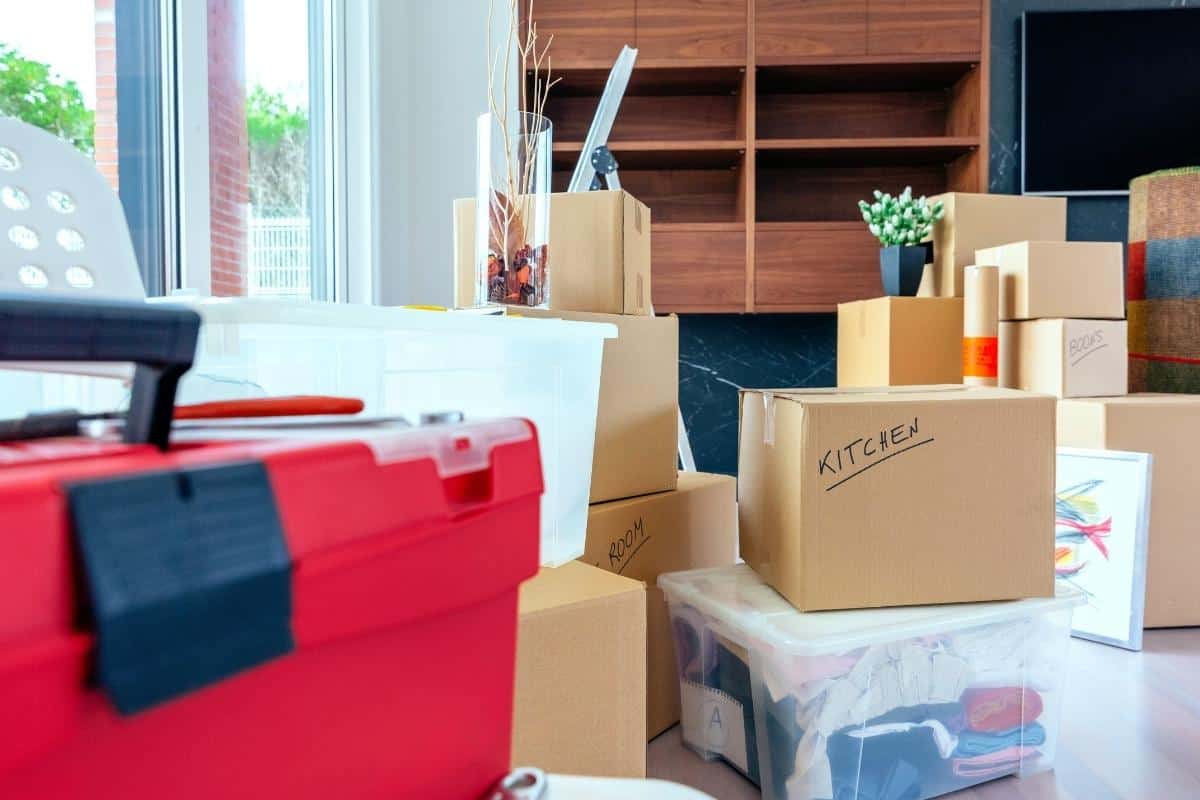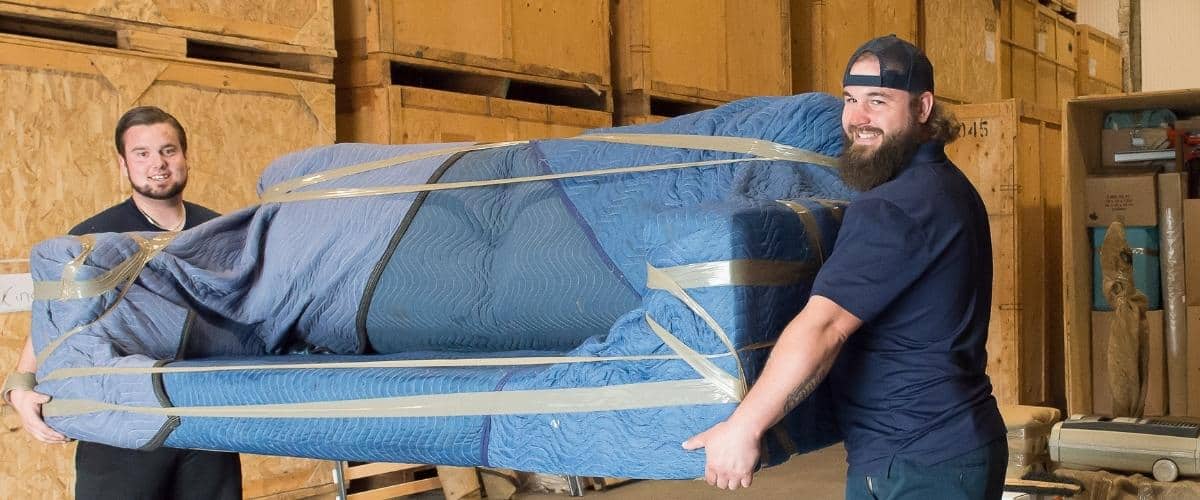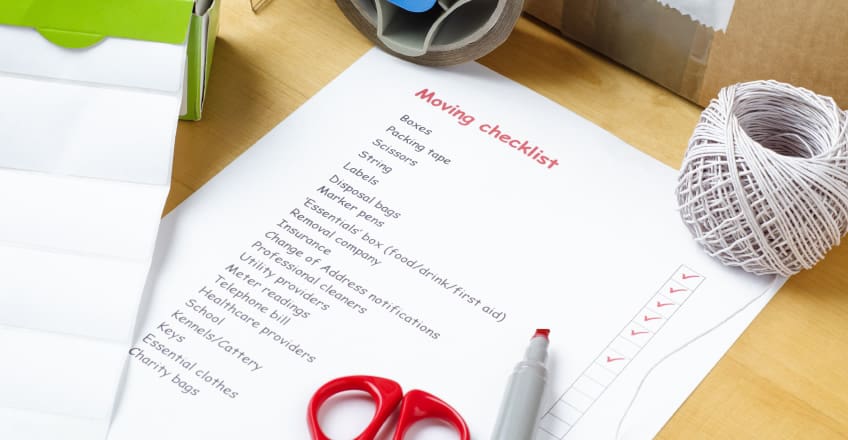Whether you plan on hiring movers or moving DIY, preparing for a move requires a ton of work to do. Whether you’re planning to move long-distance or working with local Ottawa movers, this checklist will help you get organized, and sail as smoothly as possible through the moving process.
Because booking early increases the likelihood that you’ll get the perfect time, this schedule starts early. You’ll also have more time once moving day arrives to take care of any of those little things that might crop up. Starting earlier also helps to keep you from getting overwhelmed.
Want a free copy of the checklist for your own? Here’s a peek at what’s in the checklist from our expert Clarence-Rockland movers…
Do you need a checklist for your next long-distance move? < Click this link to learn more.

11 or More Weeks Before You Move
- Get started by creating a binder or large folder for all your moving records, notes, receipts, inventory lists, contact information, and rental agreements. We call this your “moving binder”.
- Find out when the previous residents will be leaving, and when you’ll be able to get the keys to your new home.
- If you have your heart set on a renovation at your new home, getting it done before you move in is ideal. However, if someone is still living there, this may not be possible. If a furnace, or air conditioner needs replacing, get this done as well. Learn more about the pros and cons of moving vs. renovating.
- Start clearing out items you don’t want to take with you, either with a garage sale or by donating to a thrift store.
- Start doing research on how much moving will cost in Ottawa and get a few quotes from repeatable Ottawa to Kingston moving companies.
10 to 9 Weeks Before Moving
- Contact your Cassidy’s representative to book your move and find out what paperwork and processes are involved, especially if you’re moving to the United States or internationally. If you’re moving long distance to the US you can find out more here, and if you’re moving internationally you can learn more here. It’s important you find yourself a Barrhaven moving company you can trust!
- If needed, book time off from work for your moving day.
- Make any travel arrangements and reservations needed, especially if you’re moving to a new city.
- Many employers offer moving bonuses or help with expenses – make sure you find out if you qualify!
- If you have kids, contact the new school and make arrangements to transfer records and register.
- Keep your receipts! Many moving expenses can be deducted from your taxes, so be diligent and keep a record of anything and everything that you would not have had to pay for if you were not moving. Put your receipts into your moving binder.
- Make arrangements for childminding and pet sitting if needed. This can be a great job for a family member that isn’t part of your Stittsville moving crew.
- Return any items you may have borrowed and retrieve loaned items.
- If the oven needs cleaning, now is a good time to do it.
- Get yourself some packing tape, moving boxes, packing paper and other packing materials. Cassidy’s can deliver boxes right to your door!
- If you’re packing yourself, start packing with any seasonal items you won’t need in the near future. You can find more packing tips in Cassidy’s “Moving and Homeowner Tips” articles.
8 to 6 Weeks Before Moving
- Identify any large items that will need to be donated to charity or taken to the landfill.
- Take a look around your home and make plans to fix or repair anything that needs it – especially if you would like to get any security deposits back. Make sure you photograph the state of everything before and after to prove it was left unchanged.
- Identify any hazardous household items that require special disposal or recycling. Old paint, fluorescent light bulbs, old electronics, dangerous cleaners, batteries, aerosol cans, and other items are on this list, but your municipality’s website should have the full details.
- Identify any items that require special care and handling: such as firearms, paintings and fine art, glass or fragile cabinets, pool tables and pianos. You’ll need to start gathering adequate wrapping and packaging for these items and inform your Ottawa mover (especially when dealing with oversized and heavy/bulky items).
- If you have kids, make sure they understand what’s happening and when. Small children may benefit from extra consideration, like stories about moving at storytime or play activities that include the idea of moving. If possible take them to visit your new home. We have more ideas on making moving easier on kids in this blog post.
- Contact your doctor, dentist, and veterinarian, get copies of all records and make arrangements to transfer files to the new healthcare providers.
6 to 4 Weeks Before Moving
- Get in touch with Canada Post and arrange for your mail to be forwarded to your new address or local post office.
- Get your car into service and make sure it is in good condition. Address any issues before you move to ensure your vehicle is in dependable working order.
- Purchase moving boxes and proper packing supplies if needed. If you’re looking to save money, free cardboard boxes from a local grocery store might work, but you’re putting your belongings in jeopardy with packing supplies that aren’t built for the job.
- Contact your insurance provider and make arrangements to update or transfer your homeowner’s insurance, vehicle insurance, and any other policies you may have should have a change of address.
- Reach out to friends, family and neighbours to try and collect any loaned items.
- Get your health card change of address information updated.
- Arrange to update your driver’s license and license plates.
- If you’re renting your new home, make sure you know how to reach the new landlord and superintendent on moving day.
- If your new home involves elevator access, make sure you’ve booked the freight elevator.

3 to 2 Weeks Before Moving
- Arrange for all essential utilities like gas, electricity, water, and internet services at your new home. Mention the date that the services at your old home should be disconnected and if possible have your provider transfer the account over.
- Clean up and drain any gas from equipment like snow blowers, lawnmowers, etc.
- Have your rugs and draperies professionally cleaned and leave them wrapped once returned.
- Provide your new information to the Canada Revenue Agency.
- Backup your computer files. Grab an inexpensive backup drive and make sure you have copies of all your important files and documents.
- Return any cable TV equipment.
- Inform your bank, credit card lenders and any investment brokers of your upcoming move. Provide the new address and date.
- Arrange phone service at your new home if needed, and cancel your current service.
- Make sure you reach out to your neighbours and/or property manager to get permission to park outside your current and future moving residences for at least four hours. Remember, bigger moving trucks leave less space for other road users. Now would be a great time to introduce yourself to your new neighbours.
- Arrange internet service at your new home—usually your current internet service provider is able to transfer your service to your new house.
- Make sure to fill any prescriptions. Changing doctors or pharmacies can leave you stuck without your meds. Set up an appointment to schedule your refills, and get started on finding a new doctor.
- Transfer any magazine subscriptions.
- When moving to new cities like Toronto or moving to Vancouver from Ottawa, cancel any locally focused memberships and withdraw from local associations.
The Week Prior to Moving Day
- Provide your employer with any updated contact information.
- Confirm all arrangements with Cassidy’s (your Ottawa moving company). Be sure to address any modified requests and procedures in place due to COVID.
- Scan or snap photos with your phone of important documents such as passports, medical records, insurance info, and moving information as a backup in the weeks prior to moving.
- Set aside everything you’ll need for your personal items kit on moving day. This will include essential jewellery and paperwork. Keep a few essentials like pyjamas and shower gear to make for a stress-free first day. Don’t forget your toothbrush and toothpaste, personal protective equipment like masks – and an alarm clock!
- Let your neighbours know that your move date is coming up fast and that you will need to make room for the trucks (and that you will miss them terribly!) Make sure you leave a forwarding address just in case!
- If you’re travelling by plane, bus or train, find out what you can bring with you. Make sure you know what not to pack for your move.
- Set aside everything you’ll need for moving day night (for showering and sleeping – including your bed and linens) in a special area. This includes cleaning fluids and toilet paper. These items should go in the moving van or U-Haul last so that they come out first.
- Set aside everything you’ll need for the morning after the big move– coffee maker, and any other cooking equipment you’ll need to get you going on the day after.
- Before packing your refrigerator, clean it out and give away or dispose of anything you can’t move. Treat yourself to a few days’ worth of take-out for easy clean up.
- Empty and defrost freezer and refrigerator. Give any frozen food to neighbours or a charity.
- Organize any keys and make sure they’re labelled.
- Set out manuals for any appliances you’re leaving behind. Place them somewhere the new owner will spot them quickly, like the kitchen counter.
- Disconnect any electronics and keep all cables, adapters and other hardware organized and handy so that you can reconnect everything easily. Labelled freezer bags taped to the units can save a lot of time.

The Day Before Your Move
- Take down and pack window treatments.
- Create a music playlist that you can use to keep yourself and your Ottawa movers entertained and energized on the day of your move.
- Set aside house plants and boxes with fragile items so they are clearly to be treated differently when the moving crew arrives. Don’t forget to label boxes!
- If you are moving during the winter, clean driveways and walkways of ice and snow to keep your Ottawa movers safe.
- Do a final walk-through of your house to make sure everything is packed up and ready to go.
Moving Day
- Aim to have everything ready and rolling as early as possible. Issues and unforeseen circumstances always seem to pop up at the most inopportune moments.
- Make sure you have a great breakfast – you’re going to need it.
- Set aside snacks, drinks and water for yourself and all your helpers—even professional movers need to take a break!
- Have any paperwork you need today handy.
- Ensure your family and any helpers have masks and any needed personal protective equipment.
- Remove linen from beds and pack, along with any towels left.
- Dismantle beds as much as possible.
- Put any keys you’re leaving for the new resident in an obvious place.
- Leave your new address and contact information behind in case the new residents receive your mail or other deliveries post-move.
- Do any final cleaning touch-ups. A clean space with all garbage removed is one of the nicest housewarming gifts you can give to the new resident.
- Do a final check of closets, the basement, and other areas where things may have been forgotten.
- If you’ve been renting, your former landlord may want to do a final walk-through inspection with you.
- Discuss your inventory and do the walk about with the moving supervisor.
- Do a final walk around your house – lock windows and doors, turn off lights, ensure toilets and taps are not running and prepare any remaining equipment, appliances or other belongings for possible long-term storage. (eg. Unplug the beer fridge in the basement and leave the door open.)
- Take pictures and videos of your empty home. You want to be able to prove your house was in excellent condition the day you moved out.
- Tip your Ottawa movers!
After You Move In
- Change your locks and get copies of your new keys made—you never know who has copies of the old keys.
- Inspect your home and note anything in need of repair, such as burnt-out lights, dirty furnace filters, or walls that might have been dinged during your move.
- Take “Before” photos so you have a handy reference in case you decide to renovate, or need repairs in the future
- Update your documentation (such as driver’s license, health card, car insurance and registration, etc.) to reflect your change of address. Also ensure that Canada Post is aware of your move, and get mail forwarding if you want to ensure that you don’t miss anything
- Inspect your breakables and valuable items to ensure they’re in good shape after the move.
- Sit back, relax, and enjoy a successful move into your new community!

We have more helpful tips for you in our guide on how to pack to move in a hurry.
*Credits: Adapted from Canadian Housing and Mortgage Corporation and Canada Post plus over 100 years of experience!
Download Free Checklist
You’ll get an email containing links to the same list in MS Word and PDF formats.

